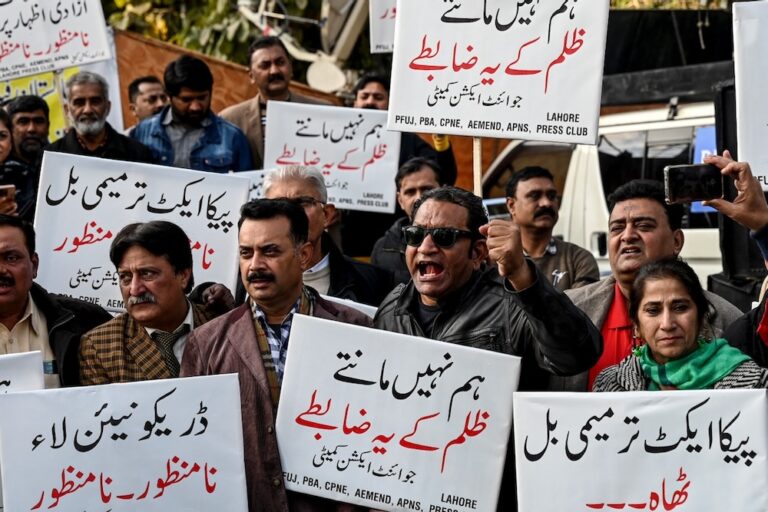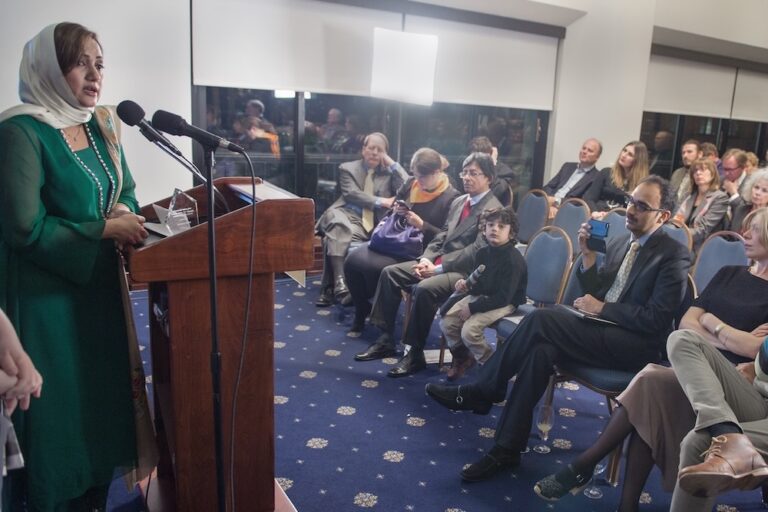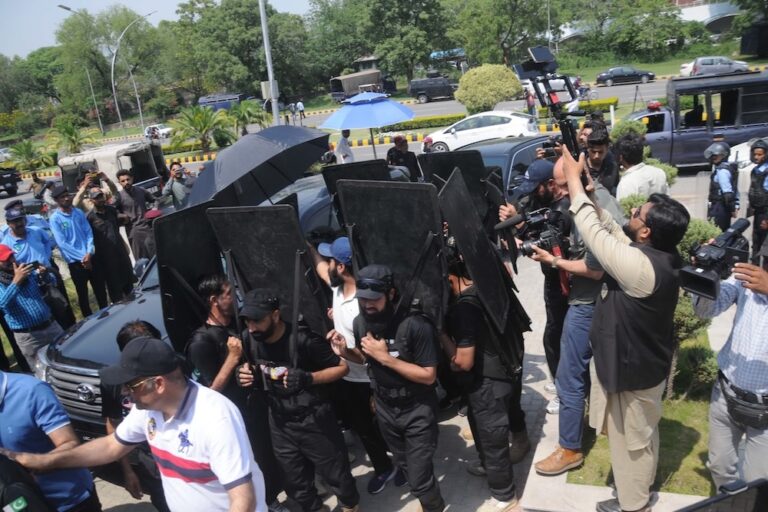(PPF/IFEX) – Police have raided the homes of two senior journalists, Idrees Bakhtiar and Naseer Ahmad Saleemi, within a forty eight hour period, claiming to be hunting for terrorists allegedly involved in the murders of an ex-governor and a senior editor. On 26 November 1998 at 1:45 a.m. (local time), Bakhtiar, a senior staff reporter […]
(PPF/IFEX) – Police have raided the homes of two senior journalists, Idrees
Bakhtiar and Naseer Ahmad Saleemi, within a forty eight hour period,
claiming to be hunting for terrorists allegedly involved in the murders of
an ex-governor and a senior editor.
On 26 November 1998 at 1:45 a.m. (local time), Bakhtiar, a senior staff
reporter of the “Herald” monthly and BBC correspondent, had his home raided
by Central Intelligence Agency (CIA) agents. According to Bakhtiar, the door
of his house was forced open by 10 to 15 police officers, a majority of whom
were wearing civilian clothes. They held the 10 inhabitants at gunpoint for
approximately 35 minutes, and refused to answer their questions. They
searched all the rooms and the rooftop, ridiculing Bakhtiar when he showed
them his identification and asked if they had a search warrant.
The officers finally left Bakhtiar’s house, only to return between five and
seven minutes later, taking his eldest son, Moonis, to one of two armoured
personnel carriers (APC) parked outside. They asked his son to identify the
whereabouts of Assistant Sub-Inspector (ASI) Naushad, one of the prime
suspects in the recent murder of the ex-governor of Sindh, Hakim Saeed.
The officers released the young man after receiving orders to do so, as
Bakhtiar had contacted the Deputy Inspector General (DIG) of Karachi. In a
press note, the DIG denied that the journalist’s house had been raided
“deliberately or with mala fide intentions.” The press note said the raid
was conducted following a tip-off that Naushad was hiding in one of the
houses. “Unfortunately, in the course of the raid, the house of Mr. Bakhtiar
was also searched,” the note said.
Prime Minister Nawaz Sharif said that the incident personally grieved him.
He deplored the forced entry and search of the prominent journalist’s
residence, and directed the Governor to personally supervise the
investigation into the incident.
Sindh Governor Moinuddin Haider took note of the raid and directed the
DIG-Karachi to hold an immediate inquiry into the matter and take action
against the individuals concerned. He asked the DIG to direct his
subordinate staff to do their homework before carrying out their actions, so
that ordinary people would not be inconvenienced. He warned that any officer
who violated these instructions would face stiff consequences.
The city’s journalists staged a protest walkout from a Karachi Stock
Exchange function where the Prime Minster gave an address. However, on the
next day, Friday, 27 November, at 2:30 a.m. (local time), the same police
team which had raided Bakhtiar’s house, consisting of two police mobiles and
an APC, raided the house of another journalist, Naseer Ahmad Saleemi, bureau
chief of the weekly “Zindagi”.
Saleemi alleged that the team first knocked at the door, and when refused
entry, broke it open and entered the house. They started harassing the
inhabitants and searched the house thoroughly. Saleemi informed them that he
was a senior journalist, but they refused to listen to him and used abusive
language. They also mistreated Saleemi’s father.
When leaving the house, the officers took Saleemi’s brother, Bashir Ahmad
Saleemi, with them. Later, he was released on the order of Deputy Inspector
General (DIG) Karachi, Farooq Amin Qureshi. The DSP claimed that the raid
was conducted after a passport, which bore Saleemi’s address, was recovered
from a terrorist allegedly involved in the 1994 murder of Salahuddin, the
editor of “Takbeer” newspaper.
Asma Jehangir, Chairperson of the Human Rights Commission of Pakistan
(HRCP), issued a statement terming such incidents gross violations of
citizens’ basic rights, and asking authorities to keep their police forces
under strict control and punish those involved in the Bakhtiar incident. She
also called for a united stand against the incident by the country’s
journalists and human right organisations.
Elizabeth Wright, acting head of regions, BBC World Service, condemned the
armed action of the Karachi police force, at Bakhtiar’s house. The BBC World
Service wrote a letter of protest to the Pakistan High Commissioner in
London seeking reassurances that BBC journalists would be allowed to work
freely in Pakistan and that this regrettable and unwarranted incident would
not be repeated.
Mahmudul Aziz, Secretary of the Council of Pakistan Newspapers Editors
(CPNE) said that CPNE was “deeply concerned and greatly perturbed by the
police excesses against law abiding senior journalists.” He added that the
apologies of the people in power were meaningless unless the problem of
police behaviour towards journalists and the public at large was not
properly addressed.
The Karachi Union of Journalists and the “Herald” Workers Union condemned
the incident and demanded the immediate arrests of the concerned police
officials. They added that such incidents designed to gag the press would
not succeed.


